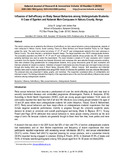Influence of Self-efficacy on Risky Sexual Behaviors among Undergraduate Students:A Case of Egerton and Kabarak Main Campuses in Nakuru County, Kenya
Abstract
This study’s purpose was to determine the influence of self-efficacy on risky sexual behaviors among undergraduate students of
main campuses in Nakuru County. Social Learning Theory by Albert Bandura and Person-Centered Theory by Carl Rogers
guided the study. The study was carried out among 3rd, 4th, 5th and 6th year undergraduate students from main campuses in
Nakuru County. The study adopted a correlational research design. The target population was 18570 undergraduate students.
The accessible population was 8456 3rd , 4th , 5th and 6th year undergraduate students whose sample was 367. Simple random sampling technique was used to select the respondents. The study included a sample of 10 peer counselors and 2 student counselors from the Egerton University and Kabarak University main campuses who were selected through purposive sampling.
Data were obtained using questionnaire for undergraduate students, focus group discussions guide for peer counselors and
interview schedule for student counselors. Validation of research instruments was done through peer and expert review and also
through pilot testing which was done in Mount Kenya University (MKU) - Nakuru Campus. Both descriptive and inferential
statistics were used to analyze quantitative data using SPSS Version 25 whereas the qualitative data was analyzed thematically.
The analyzed data was presented in tables, graphs, and narratives. The researcher considered ethics of confidentiality and
informed consent. The findings indicated that majority of the respondents were of the view that self-efficacy influence risky sexual
behaviors among undergraduate students

